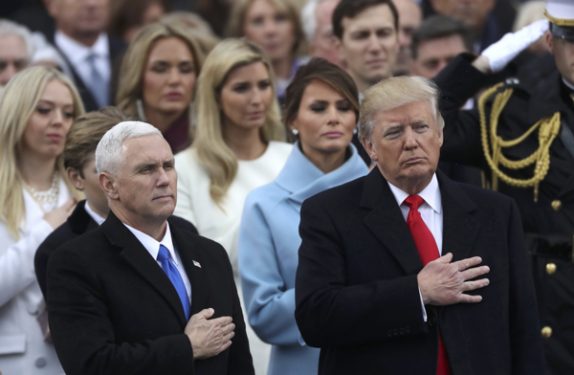Trump Appeals to People of Faith
By Christopher White, The Tablet’s National Correspondent
When Cardinal Timothy Dolan, Archbishop of New York, offered a prayer at the inauguration of President Donald Trump last January, he stressed that his role at the event was not political, but rather, pastoral.
“Many people may have reservations of the president-elect and I certainly do, as with any incoming president,” Cardinal Dolan told reporters before the inauguration. “But in the great American tradition, we look at the time of an incoming president as a time of hope… a way to give a man a chance and try to fulfill some of the promises he made.”
While the campaign promises made by candidate Trump were a source of great joy to the U.S. Catholic bishops during the first few weeks of his presidency, the rest of 2017 – with a few notable exceptions – would be marked by serious tensions between the administration and the hierarchy of the U.S. Church.
Within two weeks of taking office, Trump took executive action and reinstated the Mexico City Policy, a move that banned giving U.S. tax dollars to groups who perform or support abortion overseas. The day after the Mexico City Policy was reinstated, the House of Representatives punctuated that decision by passing legislation known as the No Taxpayer Funding for Abortion Act, which aimed to make the Hyde Amendment permanent.

The Hyde Amendment prohibits tax dollars from paying for abortion except in cases of rape, incest or threat to the life of the mother, and has been a traditional part of the annual budget approval process for over forty years.
In a historic first, Vice President Mike Pence spoke at the rally prior to the annual March for Life, which is timed to coincide with the anniversary of the Supreme Court’s decision in Roe v. Wade, which established a legal right to abortion in the United States. Pence, who was sent by the president, boasted of the administration’s recent pro-life victories and announced, “life is winning in America, and today is a celebration of that progress.”
Three months later, the confirmation of Justice Neil Gorsuch to the U.S. Supreme Court, was widely viewed as the president making good on his campaign promise to appoint a “pro-life justice” in the mold of the late Antonin Scalia, with the hope of eventually overturning the court’s 1973 decision in Roe.
On the same day that nearly half a million individuals gathered in Washington, D.C. for the March for Life, the Trump administration issued the first version of its travel ban which targeted individuals from seven Muslim-majority countries, barring their admission into the United States – and the U.S. Catholic bishops fired back with the first of many statements on the matter.
“We strongly disagree with the Executive Order’s halting refugee admissions. We believe that now more than ever, welcoming newcomers and refugees is an act of love and hope,” they wrote. “Given this extraordinary level of suffering, the U.S. Catholic Bishops will redouble their support for, and efforts to protect, all who flee persecution and violence, as just one part of the perennial and global work of the Church in this area of concern.”
If tensions over religious liberty had defined the relationship between the U.S. bishops and the Obama administration, by the end of January it was evident that immigration would be the defining issue of marked differences between the Trump administration and the Catholic Church.
In March, Cardinal Joseph Tobin of Newark also received national attention when he accompanied an undocumented grandfather of four to his deportation hearing. He used the occasion to call for comprehensive immigration reform, arguing that “the enforcement of the broken immigration system is capricious and unjust.”
In May, President Trump held a White House Rose Garden ceremony where he signed an executive order on religious freedom meant to end the standoff between the government and religious groups over the Obama Administration’s HHS contraception mandate.
“We will not allow people of faith to be targeted, bullied or silenced anymore,” said the president as he spotlighted the Little Sisters of the Poor who had become the public face of the battle over religious liberty after their case came before the Supreme Court over the HHS mandate.
Yet following the public ceremony, the U.S. bishops waited for five months – with visible annoyance – for the executive order to result in a new rule regarding the mandate.
In October – after months of promises and continued pressure from religious liberty advocacy groups – the Trump administration announced a new rule that ended the requirement for employers to provide birth control coverage in their health insurance plans if it violated “sincerely held religious beliefs.”
